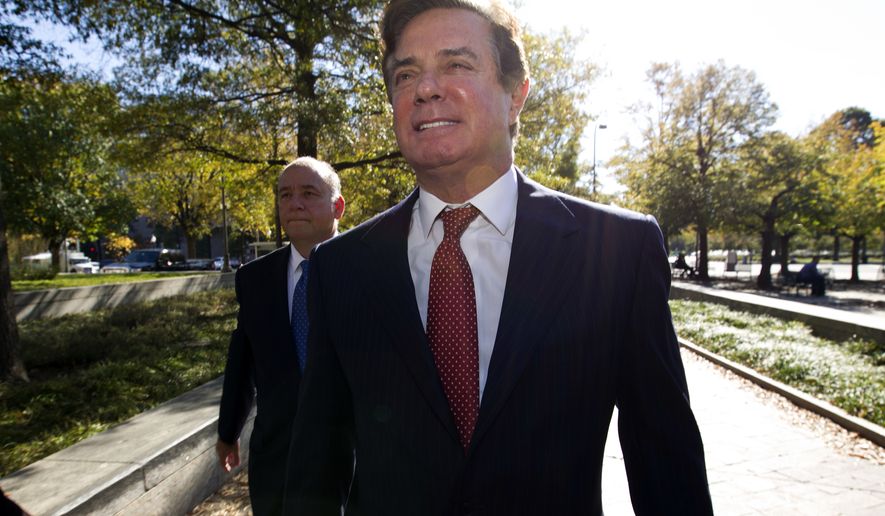An attorney for Paul Manafort is fighting back against the special counsel’s accusation that his client violated a federal judge’s gag order by helping draft an editorial defending his prior work in Ukraine — arguing that prosecutors would seek to prevent him from even maintaining his innocence.
Prosecutors from Robert Mueller’s special counsel team raised questions about the op-ed earlier this week while negotiating a bail package for the former Trump campaign chairman.
Judge Amy Berman Jackson had previously ordered all parties involved in the case “to refrain from making statements to the media or in public settings that pose a substantial likelihood of material prejudice to this case.”
Prosecutors were concerned that Mr. Manafort, who was charged with multiple criminal counts, including conspiracy to commit money laundering and failure to file proper financial disclosures, was working to ghostwrite an editorial that “clearly was undertaken to influence the public’s opinion.”
In court filings, defense attorney Kevin Downing wrote that the special counsel’s interpretation of the gag order went too far, and would “unconstitutionally vitiate Mr. Manafort’s rights to defend himself and his reputation, and to correct the public record.”
“The Special Counsel’s standard would lead to the constitutionally untenable conclusion that a defendant is not even allowed to maintain his or her innocence when such an order is entered because, by doing so, that statement might influence the public’s opinion,” Mr. Downing wrote in a six-page brief filed in court late Thursday. “In the Special Counsel’s view, Mr. Manafort is apparently never allowed to set the factual record straight. … He must simply remain silent while his reputation is battered, and potential jurors in this District might be tainted.”
Since Mr. Manafort’s Oct. 30 indictment, he has been held on house arrest and subject to GPS monitoring. He was in the process of arranging a multimillion dollar bail package in securing his release when the special counsel balked at the proposed arrangement after learning of his work on the op-ed.
Mr. Manafort had helped to fact-check the editorial, which was not targeted toward an American audience and has since been published in the Kiev Post, according to Mr. Downing.
“The Special Counsel’s opposition — devoid as it is of both legal analysis and legal precedents — claims that Mr. Manafort has engaged in wrongdoing when all he has tried to do is to correct the public record in Ukraine concerning his consulting activities in Ukraine,” Mr. Downing wrote.
The op-ed was written by Oleg Voloshin, a former spokesperson for the Ministry of Foreign Affairs of Ukraine. An editor’s note attached to the op-ed states that Mr. Voloshin told the Kyiv Post that he wrote the op-ed himself, and before its publication shared it with Mr. Manafort and his longtime associate Konstantin Kilimnik for fact-checking.
“It is totally mine,” Mr. Voloshin said in the editor’s note. “Paul has absolutely nothing to do with it.”
The editorial credit’s Mr. Manafort’s work with then Ukrainian President Viktor Yanukovych for strengthening the country’s relationship with the European Union.
“One shouldn’t ignore the fact that Ukraine under Yanukovych made a number of major steps towards the EU and the West in general,” Mr. Voloshin wrote. “And that Manafort was among those who made those paradoxical accomplishments real.”
Mr. Downing said noting in the editorial would violate the court’s order and that the court should approve the previously drafted bail package.
Under the proposed agreement, which was initially reached in conjunction with Mr. Mueller’s legal team, Mr. Manafort would have no longer been subject to house arrest or GPS monitoring. He could travel to Florida, New York, Virginia and Washington, D.C., but would need prior court approval to travel elsewhere inside the United States.
In exchange for more freedom, Mr. Manafort would agree to forfeit four properties worth a collective $11.65 million. The properties include his Alexandria home, worth $2.7 million; a $4 million residence in Bridgehampton, New York; a $1.25 million Palm Beach Gardens, Florida, home; and a Manhattan condo worth $3.7 million.
• Andrea Noble can be reached at anoble@washingtontimes.com.




Please read our comment policy before commenting.